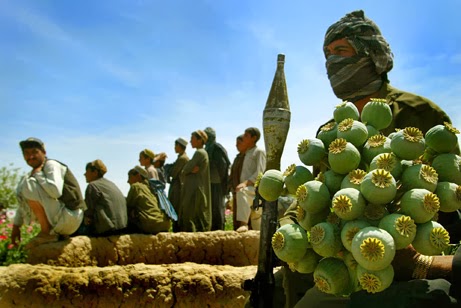Making the world safe for drugs
A funny thing happened on the way to Afghanistan, the US
and NATO protected poppy producers from the Taliban.
The "War" on Drugs - Silly, and you thought the war in Afghanistan was about terrorism.
The Taliban was eradicating poppy production as "un-Islamic". Then in comes NATO and poppy farmers are allowed to grow their crops again.
Today, with 87,000 NATO troops in Afghanistan, cultivation of poppies has hit record levels as NATO forces prepare to exit the country. The UN warned warlords may be the biggest benefactor of the situation.
The report, the Afghanistan Opium Survey for 2013, provides little cause for optimism among countries that have witnessed a surge in incidences of heroin abuse among their populace since US-led forces started a military offensive against the Taliban on Afghan soil in 2001.
Afghanistan, long the world’s main heroin supplier, has seen its total area of poppy seed plantations explode to 516,000 acres - a 36 percent increase from 2012, according to the report, released on Wednesday reports RT News.
Last year, the war-torn Central Asian country accounted for 75 percent of the world’s opium supplies; Jean-Luc Lemahieu, head of the UN Office on Drugs and Crime (UNODC) in Afghanistan, has said in the past that supplies may reach 90 percent of the global total this year.
US Soldiers guarding opium in Afghanistan?
There is a single anti-Israel photo at the end of this video that I do not like.
But 99% of the video is so cleaver that I felt I needed to post it. Let those
with open minds view it and decide for themselves.
Afghan Drugs
A Russian point of view - poppy production had been nearly abolished.
With profits from opium cultivation nearing $1 billion, or 4 percent of gross domestic product, insurgency groups like the Taliban will only benefit from the cash crop.
A massive inflow of cash connected to the sale of opium has helped the Taliban insurgency, which imposes a tax on poppy farmers in areas it controls, in addition to the outright participation in the selling and transferring of the crop.
.
Afghan government officials and tribal warlords have also helped themselves to a piece of the opium trade action.
.
"The short-term prognosis is not positive," said Jean-Luc Lemahieu, as quoted by Reuters. "The illicit economy is establishing itself, and seems to be taking over in importance from the licit economy."
.
One reason for the surge in opium cultivation is the lack of political will, which is noticeably lacking with April presidential elections on the horizon, Lemahieu said. Afghan President Hamid Karzai is ineligible to run again, while some of the potential candidates receive their financial support from poppy producers.
.
The US-led coalition has rejected any crop eradication operations by its soldiers for fear of bankrupting farmers and forcing them to join the insurgency, a policy criticized by Russia, among others.
 |
| Fast forward to 2013 Afghanistan, long the world’s main heroin supplier, has seen its total area of poppy seed plantations explode to 516,000 acres - a 36% increase from 2012. |
 |
87,000 NATO troops in Afghanistan This October 2013 map displays approximate numbers of forces provided to ISAF by Allied and other contributing nations, and countries responsible for ISAF Regional Commands. See more at: ISAF.nato.int/troop numbers. |




Tidak ada komentar:
Posting Komentar